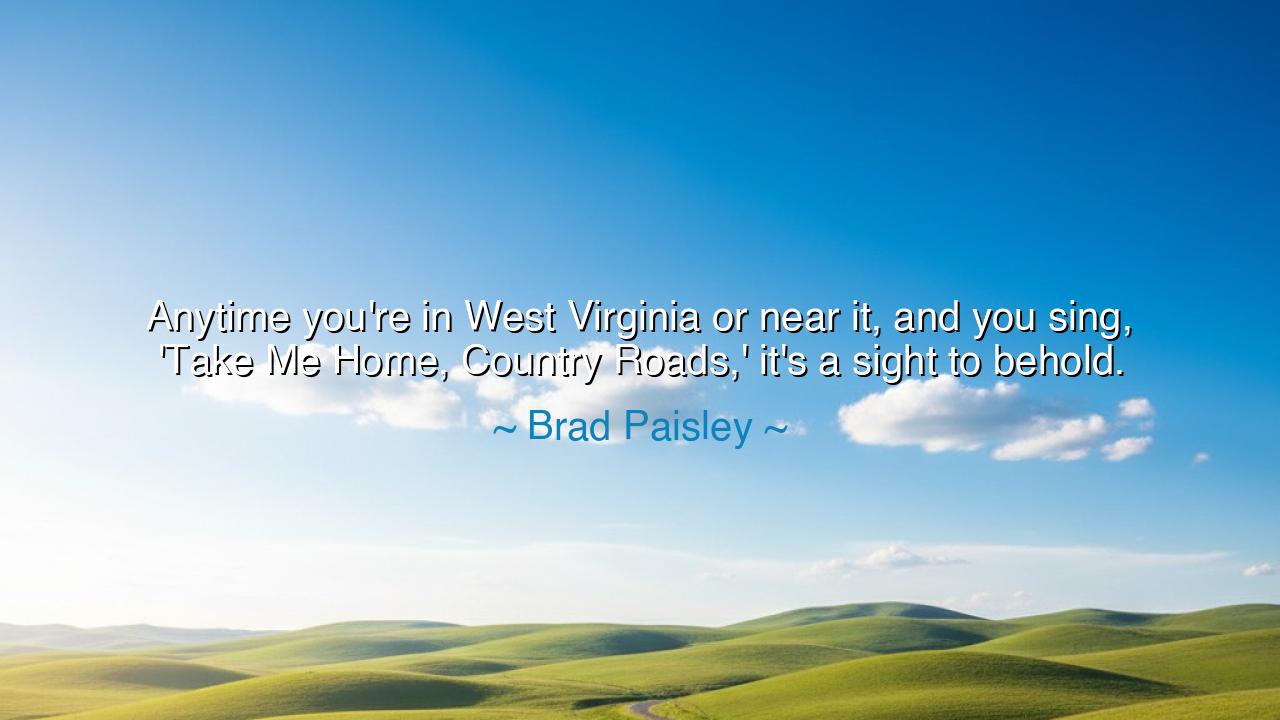
Anytime you're in West Virginia or near it, and you sing, 'Take
Anytime you're in West Virginia or near it, and you sing, 'Take Me Home, Country Roads,' it's a sight to behold.






In the bright, homespun truth of Brad Paisley—“Anytime you’re in West Virginia or near it, and you sing, ‘Take Me Home, Country Roads,’ it’s a sight to behold”—we hear how a song can become a banner, and a chorus, a kind of homecoming. This is not merely performance; it is pilgrimage. The first notes are a bell, the refrain a road. And when the people answer, they do not sing about the hills—they sing from within them, as if breath itself were braided with laurel and stream.
The ancients would say that every land keeps a hymn in the marrow of its stones. For West Virginia, the hymn is this one: a compass set to memory, a map whose ink is longing. “Country Roads” is more than melody; it is a ritual of belonging. When voices join—young and weathered, strangers and kin—the room changes shape. Time folds. The departed feel near. The hills answer back in harmonies older than any chart, and the people remember who they are when the lights are low and the workday dust still clings to the sleeve.
The origin of this power lies in the song’s simple catechism: home, named plainly; paths, spoken gently; rivers and ridgelines invoked like saints. In its unadorned phrasing, it carries the courage of confession—“Take me home”—and the tenderness of direction—“Almost heaven.” Such words practice a careful magic: they let the traveler admit both weariness and wonder. And when a crowd confesses together, a common heart is kindled, wide enough for joy and grief to stand side by side without shame.
Witness a living scene. At a night game in Morgantown, the final whistle fades. The field steams, autumn breath hangs like incense, and a hush comes before the first chord. Then it rises—row by row, a thousand throats into one—and even the visiting fans stop to listen. Some sway; some cry; some call out the harmony their grandparents taught them on porches long gone. For a minute or two, the stadium is not a place of contest but a chapel of return. This is the “sight to behold” Paisley names: not spectacle, but communion.
Look back further and you will find the same alchemy wherever a people carry home like a lantern against the dark. On far coasts, sailors once answered “Shenandoah,” letting distance dissolve in chorus. In mountain hollers, families shaped gospel from hunger and hope. The pattern persists: when the journey is long, the voice learns to build a bridge. Thus a song called “Take Me Home” becomes a public vow: we will not be lost while we can sing our way back.
From this, gather a lesson to hand down like a well-worn map: keep a song for your place, and let it keep you. Sing it when you arrive, and when you depart; sing it for the newborn and for the newly buried; sing it softly over work and loudly over worry. For a right song does not distract from reality—it interprets it, setting sorrow and celebration into a rhythm the heart can carry up the next hill.
And take these simple actions. (1) Learn the whole of your land’s hymn—verses as well as chorus—so your memory has depth, not only echo. (2) Make space for communal singing: at kitchens and ballparks, town halls and backyards; invite the shy, and sing them brave. (3) Teach the young the names of their rivers and roads; let geography become gratitude. (4) When you travel and the ache of distance bites, lend your voice to the old refrain—sing it as a compass, and let it guide you back to the home that lives in you, until your feet find the hills again and your eyes behold the sight that your heart already knew.






AAdministratorAdministrator
Welcome, honored guests. Please leave a comment, we will respond soon